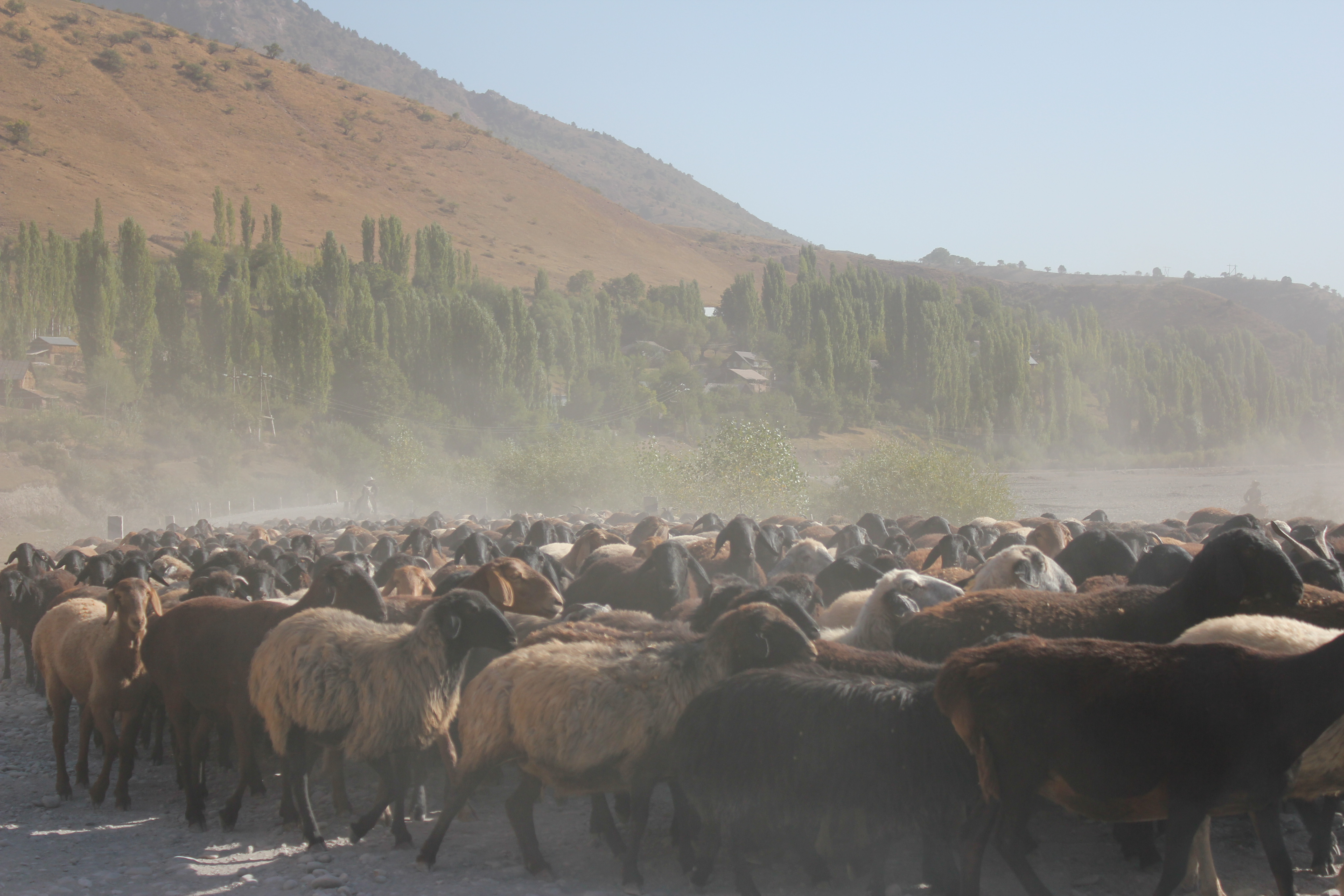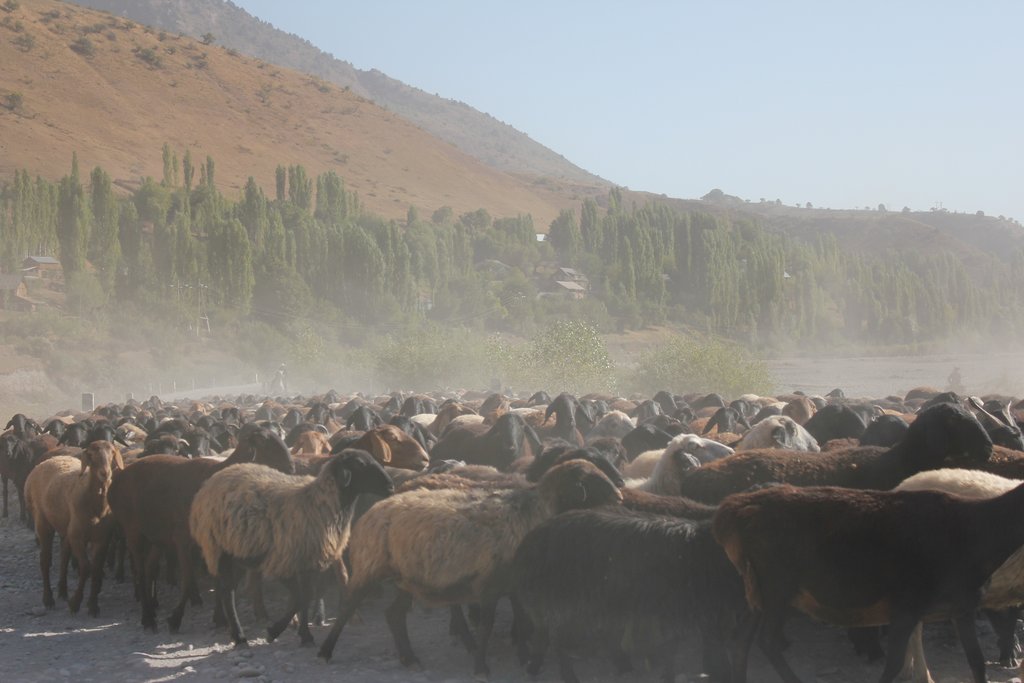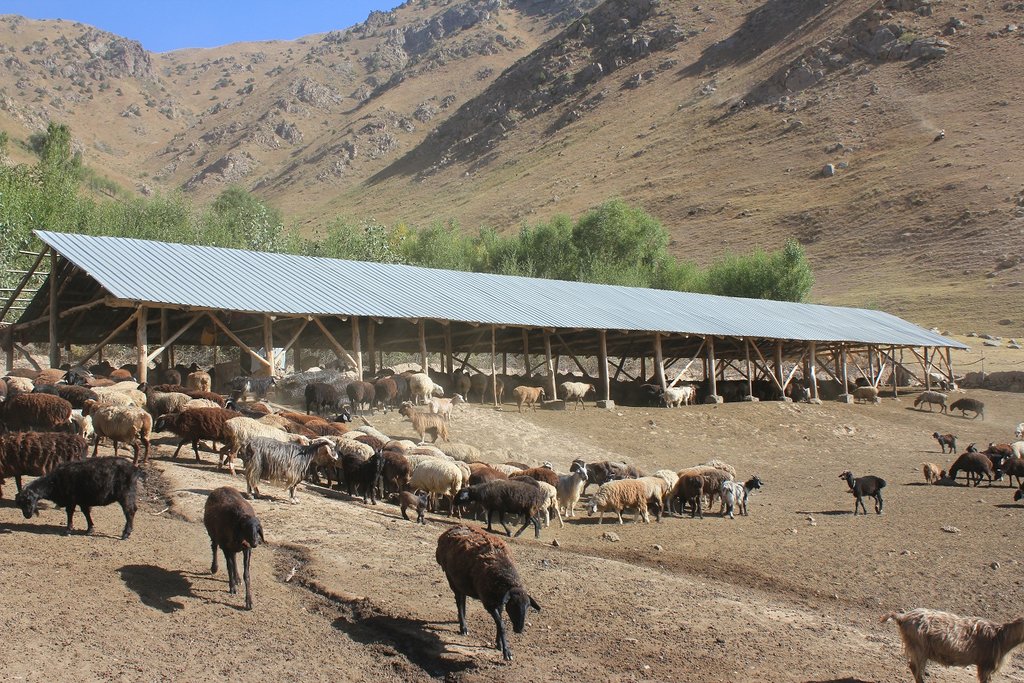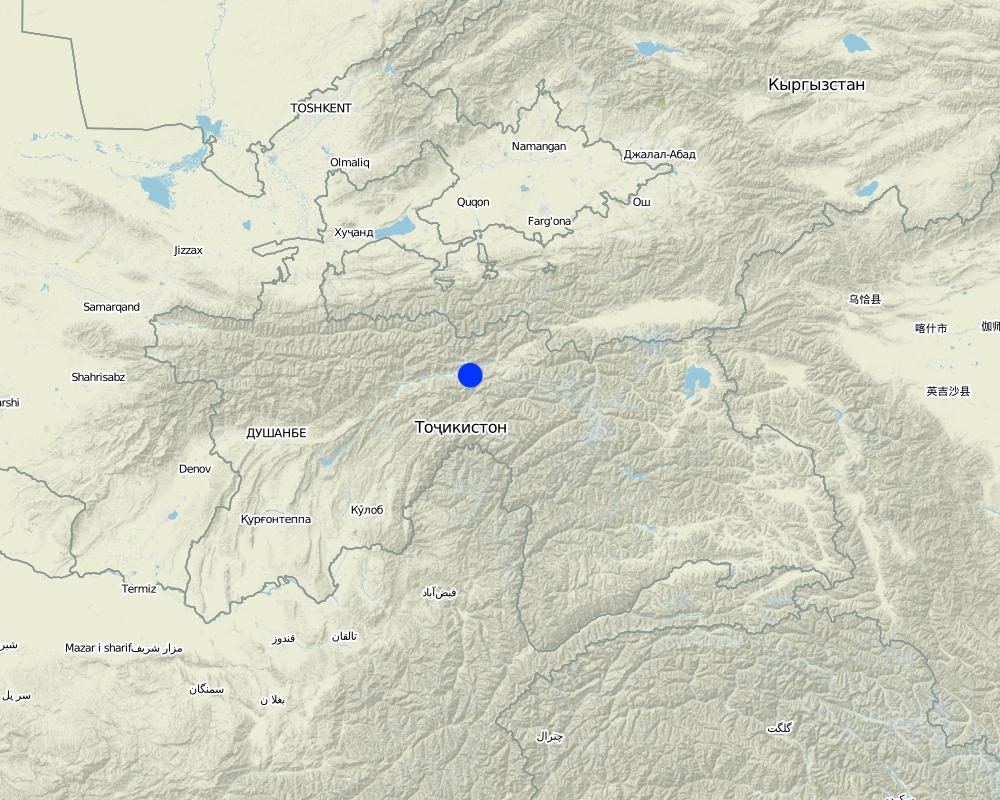Herds movement and roaming at different altitude/watershed zone [Tayikistán]
- Creación:
- Actualización:
- Compilador: Askarsho Zevarshoev
- Editor: –
- Revisor: Farrukh Nazarmavloev
Бурдани чорво ба чарогоххои дур
approaches_3630 - Tayikistán
Visualizar secciones
Expandir todo Colapsar todos1. Información general
1.2 Detalles de contacto de las personas de referencia e instituciones involucradas en la evaluación y la documentación del Enfoque
Nombre del proyecto que facilitó la documentación/ evaluación del Enfoque (si fuera relevante)
Environmental Land Management and Rural Livelihoods (ELMAR)1.3 Condiciones referidas al uso de datos documentados mediante WOCAT
¿Cuándo se compilaron los datos (en el campo)?
11/03/2018
El compilador y la/s persona(s) de referencia claves aceptan las condiciones acerca del uso de los datos documentados mediante WOCAT :
Sí
2. Descripción del Enfoque MST
2.1 Breve descripción del Enfoque
In this approach community take the opportunity to move their livestock along different pasture resources, which are located at different altitude. This is appropriate in mountains areas, where vegetation period starts in different period and community have access to fresh fodder for their animals. At this time they have the chance to save the pasture close to the village and crop land which they cultivate during summer time.
2.2 Descripción detallada del Enfoque MST
Descripción detallada del Enfoque MST:
In the mountain areas of Tajikistan pasture are distributed according to the seasonal use named also accordingly – winter/spring pasture and summer pasture. The winter pasture are usually are located in the upper zone of the watershed, while the winter/spring pasture are the one close to the community. Based on this delineation they are used in different season, because in the early spring, when snow just started melting in the close pasture in the remote pasture it is still covered by snow and not possible go to this areas. In this way community provide balance in use of pasture resource between different types of pasture resources along different altitude.
The approach is applied in a participatory way in agreement with all involved stakeholders, including community members/livestock owners, local government and other involved parties, such as herder from other communities. Community jointly in a village meeting in the early season of grazing plan for herds movements and assign responsible people with support of the village management to organize logistics.
Community is very much in favor to organize in such approach to move their animal to other places when at this period they save fodder and easily cultivate their crops land in the village. The only thing they do not like is that during this period they do not have to the dairy product, which could they get from their animals.
2.3 Fotos del Enfoque
Comentarios generales sobre las fotos:
Community build special sheds in the pasture, where the livestock is kept during night time or when there is heavy rainy days. Sometimes, in the remote pasture community build similar but closed, which is also a mean to protect from wild animal, such as bear and wolf and sometime snow leopards.
2.5 País/ región/ lugares donde el Enfoque fue aplicado
País:
Tayikistán
Región/ Estado/ Provincia:
Rasht Vally, Lakhsh District
Comentarios:
The shed, which is called kashar in local language is a traditional approach, which is constructed jointly by community efforts, but sometime external funding also support with construction as part of pasture infrastructure development
Map
×2.6 Fechas de inicio y conclusión del Enfoque
Si no se conoce el año preciso, indique la fecha aproximada en la que se inició el Enfoque:
hace más de 50 años atrás (tradicional)
Comentarios:
The approach is traditional way of movement herds along the pasture, while living in mountain communities.
2.7 Tipo de Enfoque
- tradicional/ local
2.8 Propósitos/ objetivos principales del Enfoque
The main goal of this approach is to balance the availability of pasture resources availalbe for community to gain maximum benefit from existing fodder source in the surrounding areas.
2.9 Condiciones que facilitan o impiden la implementación de la/s Tecnología/s aplicadas bajo el Enfoque
normas y valores sociales/ culturales/ religiosos
- facilitan
this is traditional approach and community members knowledge on this is transferred from generation to generation and does not have any limitation from social/cultural point of view. In fact traditionally the older generation is motivating youth to use the approach in order to use their pasture resource sustainably.
disponibilidad/ acceso a recursos y servicios financieros
- facilitan
usually not much financial resource is required to implement the resource. The only this is need to organize community and manage their resource sustainably.
entorno institucional
- facilitan
traditional institutions, which deal with natural resource management exist from very beginning. When community motivated to establish their official institutions such as Pasture User Unions this is also enables community to plan according to the approach to move the herd from one pasture area to another during different season.
colaboración/ coordinación de actores
- facilitan
traditional all members of community is involved and aware of the approach, and also when official legal institute is established it also bring all stakeholder to plan for pasture grazing in a participatory way
marco de trabajo legal (tenencia de tierra, derechos de uso de tierra y agua)
- facilitan
in a traditional way when applying the approach community know, which part of the pasture they own and plan accordingly, while when the official legal institute is established, such as PUU they obliged to gain certificate, which recognize their land use rights.
gobernanza de tierras (toma de decisiones, implementación y aplicación)
- facilitan
the approach is discussed in a participatory way among community members and agreed to implement accordingly.
conocimiento de MST, acceso a apoyo técnico
- facilitan
this is traditional knowledge which is transfered from one generation to another generation, however when applied in the framework of project special technical team is assigned to support communities with implementation.
3. Participación y roles de las partes interesadas involucradas
3.1 Partes interesadas involucradas en el Enfoque y sus roles
- usuarios locales de tierras/ comunidades locales
community members, livestock owners
support with explaining the approach based on their traditional knowledge and provide evidence based information from their experiences
- organizaciones comunitarias
village organization, traditional community structures
guide community members and livestock owners on planing and implementing the approach.
- especialistas MST/consejeros agrícolas
project technical team, specialist from respective research institutes, such as livestock institute
support with applying the technical aspect of the approach and awareness raising on the approach from science point of view.
- gobierno local
respective local government departments, such as land committee, forestry department
supervise the implementation process and guide in applying the approach within framework
3.2 Involucramiento de los usuarios locales de tierras/ comunidades locales en las distintas fases del Enfoque
| Involucramiento de los usuarios locales de tierras/ comunidades locales | Especifique quién se involucró y describa las actividades | |
|---|---|---|
| iniciación/ motivación | auto-movilización | traditionally community are used to apply approach every time when the season for grazing comes |
| planificación | auto-movilización | existing community structure in the mountains areas come together in a community meeting to discuss and develop the plan for pasture use, which entails also applying the approach |
| implementación | interactivo | usually community organize gathering dates for moving the herd, assign responsible person and agree with other stakeholders or pasture users from neighbor communities. |
| monitoreo y evaluación | pasivo | very passive monitoring is applied in monitoring the approach results and almost no research is involved. |
3.4 La toma de decisiones en la selección de Tecnología(s) MST
Especifique quién decidió la selección de las Tecnología/ Tecnologías a implementarse:
- principalmente usuarios de tierras con el apoyo de especialistas MST
Explique:
mainly land users plan for applying the approach, only sometimes when any project implemented in the area the technical team is involved and sometime supported with specialist from local government
Especifique las bases que sustentaron la toma de decisiones:
- la experiencia personal y opiniones (no documentadas)
4. Apoyo técnico, fortalecimiento institucional y gestión del conocimiento
4.1 Construcción de capacidades / capacitación
¿Se proporcionó la capacitación a usuarios de tierras/ otras partes interesadas?
No
4.2 Servicio de asesoría
¿Los usuarios de tierras tienen acceso a un servicio de asesoría?
Sí
Especifique si servicio proporcionado se realizó:
- en los campos de los usuarios de tierras
Describa/ comentarios:
government officials usually control the movement of the herd to the remote pasture, especially when there is crop season in the village.
4.3 Fortalecimiento institucional (desarrollo institucional)
¿Se establecieron o fortalecieron instituciones mediante el Enfoque?
- sí, moderadamente
Especifique el nivel o los niveles en los que se fortalecieron o establecieron las instituciones:
- local
Describa la institución, roles y responsabilidades, miembros, etc.
mainly traditional village level structure, which include all community members and leaders to plan for village development. sometime supported by local government to enforce the implementation of the approach in order not to effect the crop production in the village/community.
4.4 Monitoreo y evaluación
¿El monitoreo y la evaluación forman parte del Enfoque?
Sí
Comentarios:
very few monitoring is done, usually by the officials of local government from agriculture department to make sure that the livestock is moved to the remote pasture and there is no grazing applied in the crop lands
Si respondió que sí, ¿la documentación se utilizará para monitoreo y evaluación?
No
Comentarios:
only reported by the government and from community to the head of the village organization
4.5 Investigación
¿La investigación formó parte del Enfoque?
No
5. Financiamiento y apoyo material externo
5.1 Presupuesto anual para el componente MST del Enfoque
Si no se conoce el presupuesto anual preciso, indique el rango:
- < 2,000
Comentarios (ej. fuentes principales de financiamiento/ donantes principales):
mainly from community of provision of vehicle and other source for infrastructure development, but some projects are also have contributing in construction of the infrastructure, including Environmental Land Management and Rural Livelihoods Project
5.2 Apoyo financiero/material proporcionado a los usuarios de tierras
¿Los usuarios de tierras recibieron financiamiento/ apoyo material para implementar la Tecnología/ Tecnologías? :
No
5.3 Subsidios para insumos específicos (incluyendo mano de obra)
- ninguno
Si la mano de obra de usuarios de tierras fue un insumo sustancial, ¿fue:
- voluntario?
Comentarios:
no construction work is required to implement the approach, only organization and management capacity is needed for community to apply the approach.
5.4 Crédito
¿Se proporcionó crédito bajo el Enfoque para actividades MST?
No
5.5 Otros incentivos o instrumentos
¿Se usaron otros incentivos o instrumentos para promover la implementación de Tecnologías MST?
Sí
Si fuera el caso, especifique :
development of the community plan, which mobilize and give incentives to implement the approach
6. Análisis de impacto y comentarios de conclusión
6.1 Impactos del Enfoque
¿El Enfoque empoderó a los usuarios locales de tierras, mejoró el involucramiento de las partes interesadas?
- No
- Sí, un poco
- Sí, moderadamente
- Sí, mucho
it brings all community members, which own livestock and motivate them join management of their resources.
¿El Enfoque construyó/ fortaleció instituciones, colaboración entre partes interesadas?
- No
- Sí, un poco
- Sí, moderadamente
- Sí, mucho
while the approach bring all stakeholders together to plan and manage their resource it also strengthens collaboration among them and improves their institutions.
¿El Enfoque mitigó conflictos?
- No
- Sí, un poco
- Sí, moderadamente
- Sí, mucho
the approach enables to agree and communicate the movement of the herd, which does not interfere into the other community areas.
¿El Enfoque empoderó a grupos en desventaja social y económica?
- No
- Sí, un poco
- Sí, moderadamente
- Sí, mucho
the approach is very inclusive and does not discriminate in participation of all groups. Those of who own livestock are equally participate
¿El Enfoque alentó a jóvenes/ la siguiente generación de usuarios de tierras a involucrarse con MST?
- No
- Sí, un poco
- Sí, moderadamente
- Sí, mucho
the approach is used to be traditional and both youth and women are involved in promoting and implementing it.
6.2 Motivación principal del usuario de la tierra para implementar MST
- producción incrementada
when movement along all the pasture zone is taken place, this will lead burden to other parts and improved productivitiy
- incremento de la renta(bilidad), proporción mejorada de costo-beneficio
research results from other projects shows that movement among different types of pasture create an opportunity to use the potential production of pasture and get maximum increase in livestock productivity
- reducción de la degradación de la tierra
the approach in movement from one part to another place in the pasture leave space for the plot to fallow and regenerate
- mitigación de conflicto
6.3 Sostenibilidad de las actividades del Enfoque
¿Pueden los usuarios de tierras sostener lo que se implementó mediante el Enfoque (sin apoyo externo)?
- sí
Si respondió que sí, describa cómo:
traditionally the knowledge on the approach is transferred from generation to generation, which guarantees the sustainability, in addition local government is involved to control and supervise the herd movement among different pasture types according to the season.
6.4 Fortalezas/ ventajas del Enfoque
| Fuerzas/ ventajas/ oportunidades desde la perspectiva del usuario de la tierra |
|---|
| traditional knowledge, simple and effective in livestock management and increasing production |
| Fuerzas/ ventajas/ oportunidades desde la perspectiva del compilador o de otra persona de referencia clave |
|---|
| compliant to the concept of pasture grazing between different areas |
| supported and motivated by government in order to control both the crop production and livestock production |
6.5 Debilidades/ desventajas del Enfoque y formas de sobreponerse a ellos
| Debilidades/ desventajas/ riesgos desde la perspectiva del usuario de la tierra | ¿Cómo sobreponerse a ellas? |
|---|---|
| when the livestock is moved to remote pasture the owners does not have access or limited access to dairy product | if the pasture infrastructure is well developed it will enable community and also herder to bring the dairy product to the village to sell and process |
| Debilidades/ desventajas/ riesgos desde la perspectiva del compilador o de otra persona de referencia clave | ¿Cómo sobreponerse a ellas? |
|---|---|
| very few monitoring is applied | community capacity should be build to monitor the implementation of the approach |
| research is not involved to recognize the effect of movement | collaboration between communities and research institute to establish and support government to mobilize research institutes |
7. Referencias y vínculos
7.1 Métodos/ fuentes de información
- entrevistas con usuarios de tierras
various from community to community
- entrevistas con especialistas/ expertos en MST
3
7.2 Referencias a publicaciones disponibles
Título, autor, año, ISBN:
Pasture and Livestock Management Plan, Askarsho Zevarshoev, 2014
¿Dónde se halla disponible? ¿Costo?
Free, from compiler
Vínculos y módulos
Expandir todo Colapsar todosVínculos
No hay vínculos
Módulos
No se hallaron módulos





